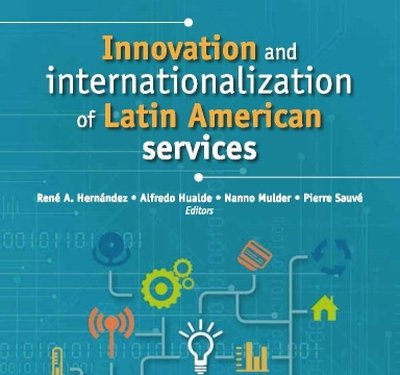27 Jul 2016
WTI contributes to frontier research on innovation and internationalisation of services in Latin America
Innovation and internationalisation in services are key drivers of structural transformation, productivity growth and overall economic performance in Latin America, as a new book, co-edited by Pierre Sauvé, the WTI’s Director for Programme Development and a MILE faculty member, shows.
‘Innovation and internationalization of Latin American services’ chronicles how the continued spread of information and communication technologies in Latin America over the past three decades has vastly enhanced both the tradability of services and the sector’s propensity to innovate. Long considered unrelated processes, both internationalisation and innovation are today widely recognised as key complementary sources of firm-level competitiveness and human capital enhancement.
The advent of many novel types of business and consumer services is furthermore a key factor in the rising insertion of Latin American firms in regional and global value chains and transnational production networks, which are now the predominant form of organisation of cross-border exchange.
The volume explores three different levels of interaction between internationalisation and innovation in the services sector in Latin America. A first part analyses the role of services in manufacturing and other sectors’ global value chains from a theoretical perspective, drawing on the experiences of Brazil and Mexico. The volume then reviews innovation and internationalisation policies and their effects on the performance of the services sector. The volume concludes with a series of case studies on innovation and internationalisation linkages in Brazil, Chile, Costa Rica and Mexico.
In the book’s opening chapter, Sauvé and his co-editors recall that for Latin American countries and firms to upgrade into services value chains, public and private initiatives must generate a host of regional public goods — enhanced investment climates, the supply of skills, greater access to finance, improved protection of intellectual property, better value appropriation, enhanced efforts at standardisation and quality certification — targeted at strengthening the links between innovation and internationalisation.
The book is published by the Economic Commission for Latin America and the Caribbean (ECLAC) in Santiago, Chile and flows from collaboration made possible under an academic cooperation project sponsored by the Swiss State Secretariat for Economic Affairs (SECO) that includes the University of Chile.
The book can be found in PDF format at: http://www.cepal.org/en/publications/innovation-and-internationalization-latin-american-services.
Further info
Sauvé, Pierre
Publisher's website


